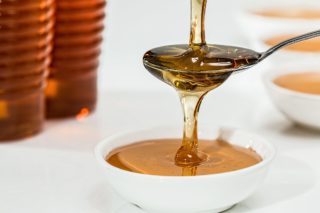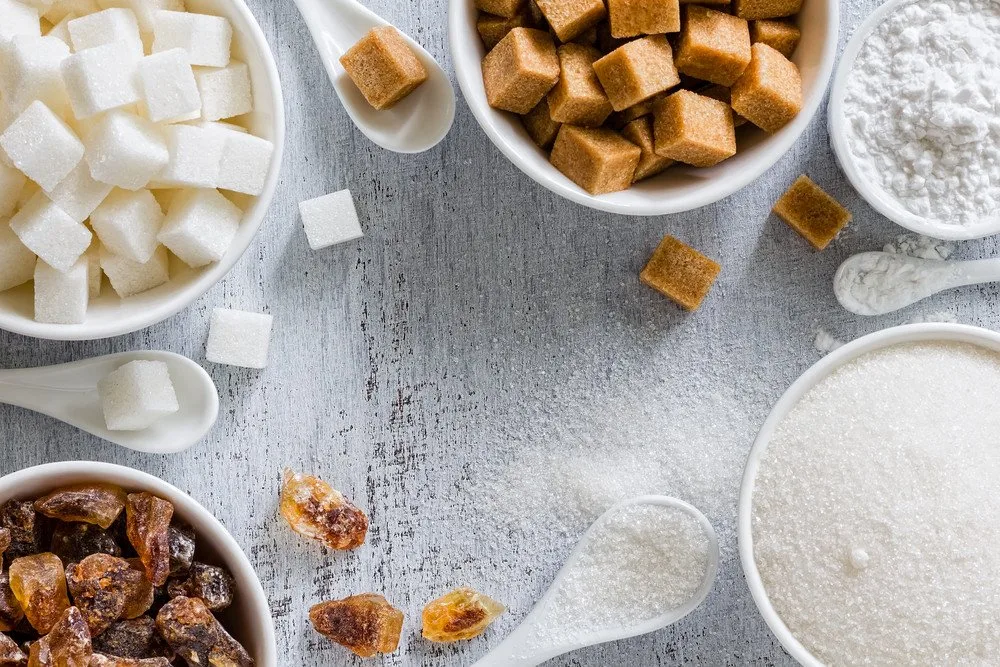Honey, sugar, sweetie. There’s a reason we give our loved ones pet names that sound like treats. From childhood, the sweet things in life are usually close to our hearts. The problem is that most forms of sugar are notoriously bad for our health. This is where artificial sweeteners and alternatives to sugar come in. To replace, reduce or alter the amount of sugar in our diet that harms our health.
Did you know?
When archaeologists started digging up the remains of the victims who died at Pompeii, they discovered that most of them had perfect teeth, with very few cavities. This was attributed to the low levels of sugar in their diet.
Today, the number of options commercially available might leave you gobsmacked. And probably a little unsure of what to add to your cart.

Artificial sweeteners
This is understandable
Because if you’re trying to be conscious of what you put into your body, you would probably have noticed that not every option would necessarily be good for you. While these artificial sweeteners are often marketed as being good options for weight loss. Due to the fact that they contain virtually no calories. They often have negative effects on consumer’s eating habits. But can they actually cause you to pick up weight? Rather than lose it?
The research on this is contradictory
Also, most healthcare experts have differing opinions on whether artificial sweeteners are helpful, harmful, or neutral to the body in general. This is why we prefer to examine the evidence and make the most informed decision from there.
According to a study published in the Journal of Nutritional Biochemistry, many artificial sweeteners can ‘induce insulin secretion and a rise in appetite’. Other studies point to the notion that, when we consume a sweet substance that contains no calories, the brain does not register the substance to have a filling effect. As a result, the brain sends a message saying we need to eat more to feel satisfied.
At the same time, we do seem to have a tendency to eat more of something when we believe a food type to be ‘diet’ or ‘healthier’ than others. Unfortunately, this tendency can also contribute to weight gain. Let’s say you buy yourself a box of sugar-free chocolate chip cookies. The sugar is replaced with Saccharin. Because it’s sugar-free – in your mind at least – this treat is ‘safer’ or ‘better for you’ than regular cookies.
No harm, no foul, right?![chocolate cookies [longevity live]](data:image/svg+xml;base64,PHN2ZyB3aWR0aD0iMSIgaGVpZ2h0PSIxIiB4bWxucz0iaHR0cDovL3d3dy53My5vcmcvMjAwMC9zdmciPjwvc3ZnPg==)
Finally, you think. Here’s a guilt-free indulgence that won’t end up on your hips. Before you know it, you’ve finished the box in one sitting. Later, you cannot understand why you’re unable to lose weight. After all, the cookies were a diet, weren’t they?
The thing is, the cookies still contained all the regular ingredients like butter, flour, and oil. They still contribute to your daily calorie intake. And if your brain didn’t register a filling effect – due to the artificial sweetener – you were likely happily chomping away without the sense of satisfaction regular cookies would have given you.
Just because something is diet, doesn’t mean you can eat as much as you’d like
Furthermore, there’s the concern that artificial sweeteners can lead to certain metabolic conditions. While more research is required to reach concrete conclusions. Studies on both mice and humans have shown that a high intake of diet soft drinks is linked to an increased risk of Type II diabetes and metabolic syndrome. Researchers also saw an association between these soft drinks and glucose intolerance. as well as a disruption in gut bacteria.
So while artificial sugars probably won’t cause you to pick up weight on their own, you might want to steer clear of them. The potential negative effects on your gut, blood sugar levels, and metabolism likely aren’t worth it. However, this does depend on your personal preference. If you’re consuming artificial sweeteners without experiencing cravings or poor blood sugar control, there’s no need to change.
Consumers need to be aware of the fact that for every option available, there are pros and cons to be considered. The better informed you are, we believe, the better choices you will be able to make about your own health.
So make sure you know your sugars from your sweeteners.
Artificial sweeteners

- Sucralose (Splenda)
- Saccharin (SugarTwin, Sweet’nLow)
- Aspartame (NutraSweet, Equal)
- Neotame
- Acesulfame potassium (Sunett, Sweet One)
Novel sweeteners
- Stevia extracts (Pure Via, Truvia)
- Tagatose (Naturlose)
- Trehalose
According to the Mayo Clinic, novel sweeteners are hard to fit into one category because of what they’re made from and how they’re made. They sometimes have a strange aftertaste that many people dislike. However, they are considered less harmful than artificial sweeteners.
Sugar alcohols
- Erythritol
- Hydrogenated starch hydrolysate
- Isomalt
- Xylitol
- Maltitol
- Mannitol
- Sorbitol
Sugar alcohols are various types of sweet-tasting carbohydrates that are hybrids of sugar and alcohol. However, they do not contain any ethanol. Some are naturally occurring in fruit, but the majority are processed from other sugars. Such as the glucose in corn starch. Unlike artificial sweeteners, sugar alcohols do contain calories. However, they contain far fewer calories than sugar.
Most sugar alcohols have a low glycaemic index and do not spike blood sugar levels or insulin (maltitol is the exception, with a glycaemic index of 36). They are therefore considered relatively safe. The only concern is the possibility of digestive complications. The body is unable to digest many of them. As a result, some people suffer from gas, bloating, and diarrhea when they consume sugar alcohols in large amounts or too frequently. Again, this will vary from person to person and many people tolerate sugar alcohols very well.
Erythritol, for example, has none of the digestive issues as other sugar alcohols, because it is absorbed before it reaches the large intestine in significant amounts.
Natural sweeteners
- Maple syrup
- Agave nectar
- Date sugar
- Fruit juice concentrate
- Honey
- Molasses
 If you’re looking for a safe alternative to sugar, natural sweeteners are still considered the safest option with the least side effects. Also, by consuming natural options like raw honey and blackstrap molasses, studies have shown that you can increase your antioxidant intake.
If you’re looking for a safe alternative to sugar, natural sweeteners are still considered the safest option with the least side effects. Also, by consuming natural options like raw honey and blackstrap molasses, studies have shown that you can increase your antioxidant intake.
Furthermore, raw honey contains healthy enzymes, as well as iron, zinc, potassium, calcium, phosphorous, vitamin B6, riboflavin, and niacin. Not only do these nutrients help to neutralize free radicals. But they also help to promote the growth of healthy bacteria in the digestive tract.
Bottom line
That being said, in the same way, that you cannot eat more of something just because it’s labeled ‘diet’. You cannot think it’s safe to go overboard just because it has health benefits.
For example, a very common mistake people make is adding large amounts of honey (along with nut butter, avocado, seeds, and coconut oil) to their breakfast smoothie and thinking they’re on a great track to good health.
Yes, their bodies will probably benefit from ample nutrients in the smoothie. At least in the short run. But they forget that these specific ingredients are very high in both sugar and fat, and therefore, also in calories. So, if weight loss was the goal, they would enjoy better results if they focused on adding leafy green vegetables, a small amount of fat (such as a teaspoon of nut butter or avocado), and lean protein, like yogurt. A dollop of honey should be seen as a treat, especially if you’re trying to lose weight.
Some fresh fruit, like a handful of berries, is also a good idea if you’re trying to add a bit of sweetness. If you’re having trouble staying away from sugar or artificial sweeteners, speak to your dietician about ways to wean yourself off the white stuff. Sugar addiction is something many people struggle with, and it can pose a big challenge to one’s health goals.
Want to know more?
Find out how to build your best smoothie yet – with powerhouse ingredients, no less.
References:
https://www.medicalnewstoday.com/articles/318392#takeaway
Suez J, Korem T, Zeevi D, Zilberman-Schapira G, Thaiss CA, Maza O, Israeli D, Zmora N, Gilad S, Weinberger A, Kuperman Y, Harmelin A, Kolodkin-Gal I, Shapiro H, Halpern Z, Segal E, Elinav E. Artificial sweeteners induce glucose intolerance by altering the gut microbiota. Nature. 2014 Oct 9;514(7521):181-6. doi: 10.1038/nature13793. Epub 2014 Sep 17. PMID: 25231862.
Fagherazzi G, Vilier A, Saes Sartorelli D, Lajous M, Balkau B, Clavel-Chapelon F. Consumption of artificially and sugar-sweetened beverages and incident type 2 diabetes in the Etude Epidemiologique aupres des femmes de la Mutuelle Generale de l’Education Nationale-European Prospective Investigation into Cancer and Nutrition cohort. Am J Clin Nutr. 2013 Mar;97(3):517-23. doi: 10.3945/ajcn.112.050997. Epub 2013 Jan 30. PMID: 23364017.



![chocolate cookies [longevity live]](https://longevitylive.com/wp-content/uploads/2018/11/chocolate-close-up-cookies-230325-320x213.jpg)
![women [longevity live]](https://longevitylive.com/wp-content/uploads/2020/01/photo-of-women-walking-down-the-street-1116984-100x100.jpg)










